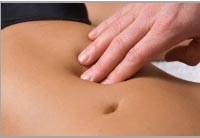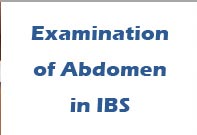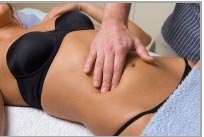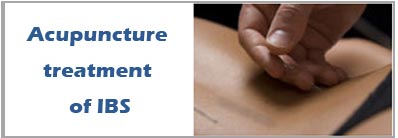Treatment of Irritable Bowel syndrome (IBS)
by Chinese Acupuncture Clinic Acumedica



The irritable bowel syndrome (IBS) indicates that certain diet and stress in life -things that don't normally wreak havoc on other people- give alternating bouts of diarrhea, constipation, and abdominal pain. Some-times, you get all three at the same time. it may also be associated with other gastrointestinal signs and symptoms, such as flatulence, bloating, and nausea. The symptoms are always aggravated by stress. The doctors think that irritable bowel syndrome (also known as spastic colon or mucus colitis) may be second only to the common cold and your doctor now says that irritable bowel syndrome (IBS) is the source of your complaint. The percentages of 5-15% (among British population) are affected by IBS with more women than men being affected. The main cause of IBS in Western Medicine is unknown. While in Chinese Medicine, the IBS is described as a disharmony in both, the liver and the spleen functions. The stagnation of energy “Qi” and “blood” flow in the liver organ can be caused by stress and emotional disturbance. This can be associated with weakness in spleen “Qi” which is caused by unhealthy food, excessive work exhaustion and lack of Many clinical research studies carried out on using acupuncture on IBS have been successfully reporting positive results. These studies have documented that Chinese medicine can effectively treat IBS in a safe and drug-freeway.

The following are some useful measures that may help to alleviate symptoms along-side acupuncture treatment:
1. Take the news In stride
There's a very good connection between stress and an irritable bowel. What you don't want to do is get stressed because you have an irritable bowel, and thereby create a “vicious cycle,". Especially during flare- up ofabdominal pain, so it is important to:
| take a deep breath | |
| think about what is happening | |
| recognise that it is happened before and it will pass | |
| know that you are not going to die because people do not die from irritable bowel. |
2.Become a more relaxed person
Anything you can do to help yourself unwind should help to alleviate your symptoms and you may benefit from relaxation techniques, such as meditation, self-hypnosis, or biofeedback. If the stress in your life is particularly problematic, you may want to consider psychological counselling. The key is to find what works for you.
3. See yourself pain-free.
Remember the last time your irritable bowel gave you an attack of abdominal pain? You panicked. You got all stressed up inside. Didn't you? And -ironically-by getting stressed, you tensed your bowel, and probably helped of bring on more pain. How can you break this nasty cycle? With: - visualization: it is a very effective tool for dealing with pain and anxiety. By learning visualization techniques with a professional is probably the best route. But there's nothing wrong with trying a few on your own. Here are the following few suggestions: If you feel pain, stop what you're doing, find a comfortable place to sit or lie down, close your eyes, and instead of focusing on your pain-see yourself instead:
| Diving expertly into the warm ocean surf off a beautiful, white-sanded,tropical island beach. | |
| Standing atop, a tall, snow-crested mountain, breathing the cool air, andlistening to the crunch of snow under your feet. | |
| Sitting in a large wooden hot tub, chatting idly with several of your closestfriends. | |
| Walking through a lush garden in a far-off, exotic land.. |
4. Keep stress diary
Persons with an irritable bowel have an intestinal system that over-reacts to food, stress and hormonal changes. Think of your irritable bowel as a built-in barometer and use it to help you determine what things in your life are most successful.
5.Log In your food and beverage intake, too
Certain food and beverages, just like stress, can activate an irritable bowel, so it's also helpful to record in your diary the foods and beverages that give you the most trouble. Although there are some things that are likely to disturb most people, everyone is different.
6.Add fibre to your diet
Many people with IBS do much better, simply by adding fibre to their diets. Fibre tends to be most effective with people who tend toward constipation and small hard stools, but it may also help you if you're suffering from diarrhoea. The best fibber to add to your diet is the non-soluble type found in bran, wholegrains, fruit, and vegetables.
7.Call psyllium seed to the rescue
An easy way to increase your fibre intake is with crushed psyllium seed. It's a natural laxative sold in pharmacies, supermarkets, and health food stores. Unlike chemical laxatives often found on the same shelves, psyllium-based laxatives such as Metamucilarenonaddictive and generally safe, even when taken over long periods.
8. Drink lots of fluid
To keep your bowels moving smoothly, you need not only fibre, but fluids as well. You'll need more on August days spent playing tennis than on December days spent at the movies, but in general "you should drink between six and eight glasses of fluid a day”.
9. Reconsider dairy products
One fluid you may do better without is milk. A large number of people who say they have IBS are really lactose intolerant. It means your body has difficulty absorbing lactose, an enzyme found in milk. Your doctor can test you for lactose intolerance. Or you can give up dairy products for a couple of days and see how you do. In either case, you may find this one dietary change can clear up all your Problems.
10. Cut out the fat There are lots of good reasons to eat a low-fat diet because fat is a major stimulus to colonic contractions. It can worsen your IBS. A good place to begin to cut fat in your diet is by eliminating heavy sauces, fried foods, and salad oils.
11. Pass on the gas
Some people with IBS are particularly sensitive to gas-producing foods. If you fall into this group, you may find relief by avoiding such flatulence champs as beans, cabbage, Brussels sprouts, broccoli, cauliflower and onions.
12. Go easy on the bran
If you are adding fibre such as bran to your diet, add it slowly to give your body time to adjust. Too much fibre, too fast, can produce gas.
13. Beware of spicy foods
Some people with IDS are sensitive to foods laden with pepper, and other spices. Try eating a lot of spicy foods for one week and a lot of bland foods the next week and note if your condition has changed.
14. Be careful of acids
Acidic foods tend to bother some people with IBS. Here again, you may wish to experiment by laying of such things as oranges, grapefruits, tomatoes, and vinegary salad dressings for a while, to see if things get better.
15. Don’t brew trouble with coffee
Coffee is a major cause of woes among people with IBS. To some extent, the culprit may be caffeine, but it may also be the resins in the coffee bean itself. You may get some relief if you switch to decaffinated- if not, try cutting down on all coffee.
16. Know that the alcoholic beverages are bad for IBS
All alcoholic beverages can exacerbate your problems and that is because the complex carbohydrates in beer and the tannin in red wine are probably causing the most grief. Drinkers with IBS should avoid these two drinks.
17. Put out that cigarette A large number of people experience IBS problems with smoking. The most probable culprit is the nicotine, so if you're trying to quit (which can be achieved with the help of acupuncture) you may see the difference in your tummy problems.
18. Spit out the gum
Gums and candies artificially sweetened with sorbitol are not easily digested and can worsen your IBS. While the amount of sorbitol found in one stick of gum or one hard candy isn’t likely to affect you greatly, if you gobble up ten or more such sweeties aday, it's time to cut back.
19. Eat regular meals
It is not only what you eat, but how you eat that can vex an irritable bowel Digesting a lot of food eaten all at once overstimulates the digestive system. That is why it's much better to eat frequent smaller meal than infrequent larger ones.
